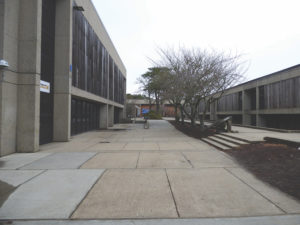EASTHAM — Students in the Nauset Regional Schools began working from home last week as the district rolled out its alternative learning online program. All schools remain closed until at least May 4. Everyone is learning in this new setup — students, teachers, administrators, and parents.

Middle and high school students work on lessons using Google Classroom. Teachers post to the online platform, with classes focused, for now, on math, science, English, and social studies.
“We’re taking it week by week,” said Middle School Principal Julie Kobold. That way, she said, teachers and parents can regroup “to find out what’s working and what’s not.”
Elementary students are also getting assignments and feedback online, according to Eastham Elementary Principal William Crosby, using a variety of platforms depending on the skills of both students and staff.
“Parents have been amazing,” Crosby said by email. “They have been thrust into home schooling their children.”
Administrators know this is not easy. “It takes a lot of intrinsic motivation to work from home,” Kobold said.
Lessons Learned
A few best practices are already emerging, according to Kobold. For example, Nauset heard from other systems that closed down earlier that trying to hold classes in real time does not work well because families are keeping very different schedules at this point.
For example, “Some older kids are babysitting younger kids during the day if their parents have to go to work,” said Kobold. “We tried to take into account the different spaces everyone is in.”
That means students are able to complete work on assignments on their own time. But that fact does not mean students are on their own, the administrators emphasize. “The teachers are in daily communication with their students in a variety of ways,” Crosby wrote, including videoconferencing, email, and phone.
Teachers and administrators can track the work being done. If students aren’t doing their work, teachers will reach out to make sure everything is all right. “We don’t want people to fall through the cracks,” Kobold said.
School administrators aren’t expecting students to sit in front of an iPad for the same amount of time as they would spend in school. “A number of our teachers are also working on creating enrichment opportunities that do not rely on electronics,” Kobold said, like a gardening option or a workout.
Access to iPads has not been a major issue. Students in grades 8 through 12 have iPads assigned to them at the beginning of the year to use at school and home. Seventh graders use theirs at school only, and sixth graders don’t have assigned devices. But when school closed, the district assigned iPads to sixth graders, which were picked up by parents.
Crosby said 80 iPads were distributed to elementary students in need of a device.
Internet access is a bigger challenge, Kobold said. On the Outer Cape, coverage can be spotty. Truro Select Board Member Stephanie Rein said her children have had issues completing their work because their internet connection, which is via satellite, is not robust enough for streaming service.
Rein said that means if teachers want to hold a video conference or ask students to watch a TED Talk or some other lecture online, then her children cannot participate.
Administrators have been accommodating, Rein said. “Often, a crisis highlights problems that were already there,” she added. “Connectivity on the Outer Cape as a whole is a problem.”
MCAS Status
Gov. Baker is proposing legislation that would give the state Dept. of Elementary and Secondary Education (DESE) more flexibility on whether and how to hold MCAS testing this year, according to Jacqueline Reis of DESE.
Reis said DESE did receive a federal waiver on MCAS testing, but the state legislature needs to act as well.
Nauset Supt. Tom Conrad said at the regional school committee’s most recent meeting on March 13 that he “couldn’t care less about the MCAS tests right now.”
Renovation Project Update
The regional school committee did not vote on the bonding method for the high school renovation project and instead is suspending any vote on the project until town meeting dates are firm.
Wellfleet has postponed its town meeting to June 1 and the other three district towns may follow suit. In that event, said Nauset Building Committee Chair Greg Levasseur, the district can file for a 120-day voting extension with the Mass. School Building Authority (MSBA).
The MSBA voted on Feb. 13 to approve the $131.8 million project proposal and fund roughly $36 million of it, but the project needs town meeting approval from the four district towns, Wellfleet, Eastham, Orleans, and Brewster, to go forward.



